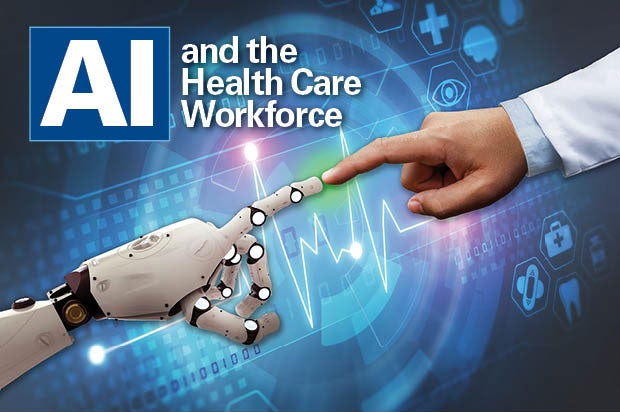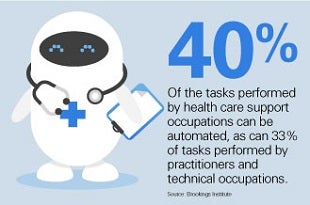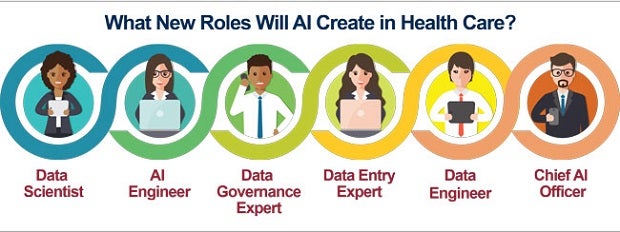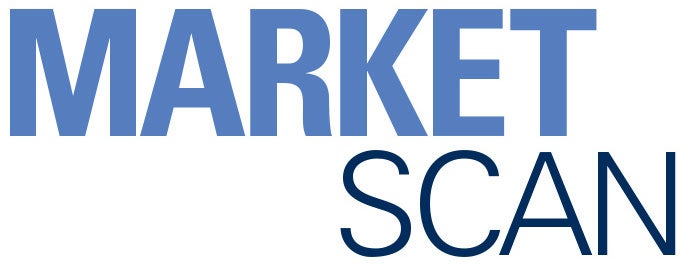

New AHA Report Demystifies AI and Implementation

Separating hype from reality can be challenging when assessing artificial intelligence and its potential to transform how work is done in administrative, clinical, operations and financial settings. But a new AHA Center for Health Innovation Market Insights report — “AI and the Health Care Workforce” — will help health care executives cut through the clutter.
Developed with insights and tips from 20 experts from provider organizations, AI system developers and technology consultants, the report provides essential information for understanding AI capabilities and limitations, and covers key considerations for integrating AI into the workforce.
The content will help health care leaders:
- Understand how AI will change the nature of work.
- Identify where to begin the AI journey.
- Find ways to overcome common AI adoption challenges.
- Assess critical success factors for integrating AI into the workforce.
 This report is part of a series of assets the AHA Center for Health Innovation is rolling out to provide greater context and understanding of AI’s impact on health care. Special member-only content includes Tips and Tricks for Selecting the Right AI Vendor Partner and 18 Questions for Leadership Teams.
This report is part of a series of assets the AHA Center for Health Innovation is rolling out to provide greater context and understanding of AI’s impact on health care. Special member-only content includes Tips and Tricks for Selecting the Right AI Vendor Partner and 18 Questions for Leadership Teams.
“Hospitals and health systems are looking past the hype of artificial intelligence as simply an innovation for innovation’s sake, but rather as an implementable and sustainable means to achieve clinical and organizational goals,” says Andy Shin, chief operating officer of the AHA Center for Health Innovation. “We hope these insights, frameworks and tools help demystify the mystery behind AI so that health care leaders can focus on the operational, technological and cultural work that goes into transformation.”
As the core report highlights, AI has the potential to produce better clinical, operational and financial results. However, this will require significant changes in the composition, competencies and skill sets of the health care workforce.
New roles are emerging in provider organizations that are embracing AI, and the report provides an overview of six key positions: data scientist, AI engineer, chief AI officer, data governance expert, data entry expert and data engineer.

What AI-enabled Professionals Need Most
As hospitals and health systems continue to evolve their AI integration strategies, they’ll need to consider five new digital skills, traits and educational requirements for staff, including:
- Digital acumen: The ability to work comfortably with AI in entering and accessing data, using data in their workflows and incorporating data/insights into decision-making.
- AI acumen: A basic knowledge of how AI works and an understanding of why it generates certain outcomes, conclusions or recommendations based on the information it’s being fed.
- Data appreciation: A passion for protecting the privacy and security of patients’ personal health information as it’s used by AI in new and different ways and for consistently following the provider organization’s data-governance policies.
- An open mind: A willingness to see AI as a career opportunity rather than a threat to job security, to collaboratively work with other disciplines like technologists, operations and clinicians to design effective AI models.
- Agility: More than anything else, the attribute to bring to work every day will be agility. Hospitals and health systems will need a workforce that can roll with change, turn on a dime and embrace a new AI model that creates greater value.
The report also provides recommendations for how leaders in hospitals and health systems can develop digital skills in their workforce.
For more on how applying AI technologies can help you make better informed decisions and redesign care to the advantage of your patients and your organization, attend the Dec. 3 AHA members-only Executive Forum in Chicago.



